THE SMASHING MACHINE (2025)
The story of mixed-martial arts and UFC champion, Mark Kerr.
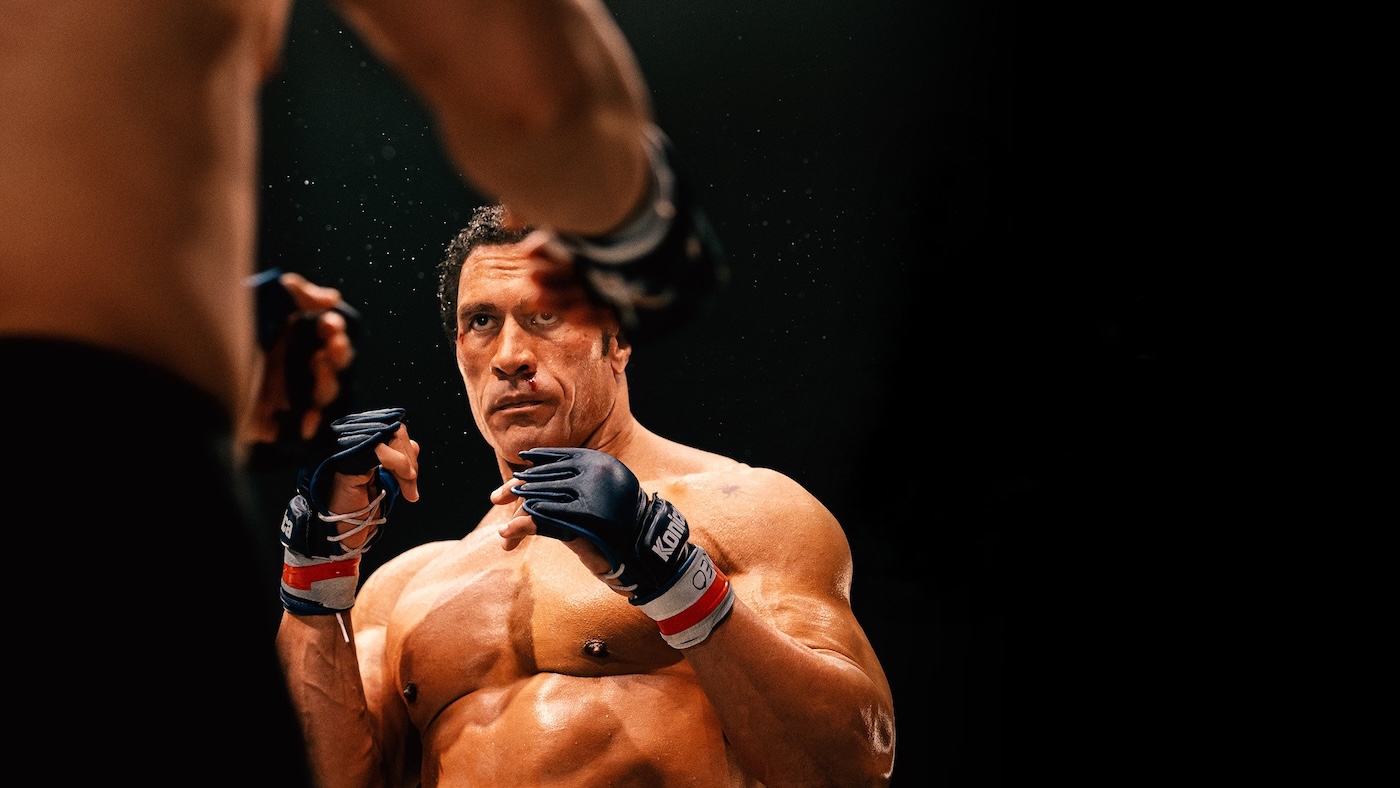
The story of mixed-martial arts and UFC champion, Mark Kerr.

The UFC (Ultimate Fighting Championship) stands today as one of the most recognisable and commercially dominant institutions in global combat sports. Since its inception in 1993, the organisation’s evolved from a spectacle into a multi-billion-dollar empire, producing household names such as Conor McGregor (Road House), Ronda Rousey (Furious 7), and Joe Rogan (Zookeeper). However, long before its rise to mainstream legitimacy, the UFC was derided as a brutal blood sport and faced widespread criticism for its unregulated violence and absence of rules. During its tumultuous formative years, before regulations such as “no biting” and “no eye-gouging” were gradually introduced, the promotion was banned in several states across the United States and struggled to stay visible under growing political and media pressure.
Among the early generation of fighters emerged Mark Kerr, a highly accomplished wrestler whose entry into the burgeoning UFC bridged the gap between primal spectacle and legitimate sport. His ferocious dominance in the octagon brought a measure of credibility and excitement to an organisation desperate for legitimacy. However, during his pursuit of excellence, Mark became addicted to prescription painkillers and was trapped in a cycle of self-sabotage. Writer-director Benny Safdie (Uncut Gems) translates this almost Shakespearean tragedy into an unflinching study of ambition and addiction. Rejecting the familiar triumphalism of most sports biopics, The Smashing Machine illustrates both the glory and the cost of being a pioneer.
This path of destruction takes place between 1997-2000, when Mark Kerr (Dwayne Johnson) made his ferocious debut at Brazil’s infamous World Vale Tudo Championship. After annihilating all three opponents with his terrifying physicality and merciless aggression, he earns himself the fearsome moniker, ‘The Smashing Machine’. Inevitably, Mark’s formidable ferocity makes him an object of international fascination in the burgeoning world of the UFC. With his prowess now a commodity, he ultimately signs a lucrative contract with the Japanese organisation, Pride Fighting Championships. However, his veneer of invincibility is destroyed after losing his first match to Igor Vovchanchyn (Oleksandr Usyk). After becoming consumed by the unbearable weight of expectation, opioid dependency, and a disintegrating relationship with his girlfriend Dawn Staples (Emily Blunt), his life begins an inexorable spiral into self-destruction. However, with the support of his closest allies, Mark attempts to reclaim both his place in the octagon and his sense of identity.
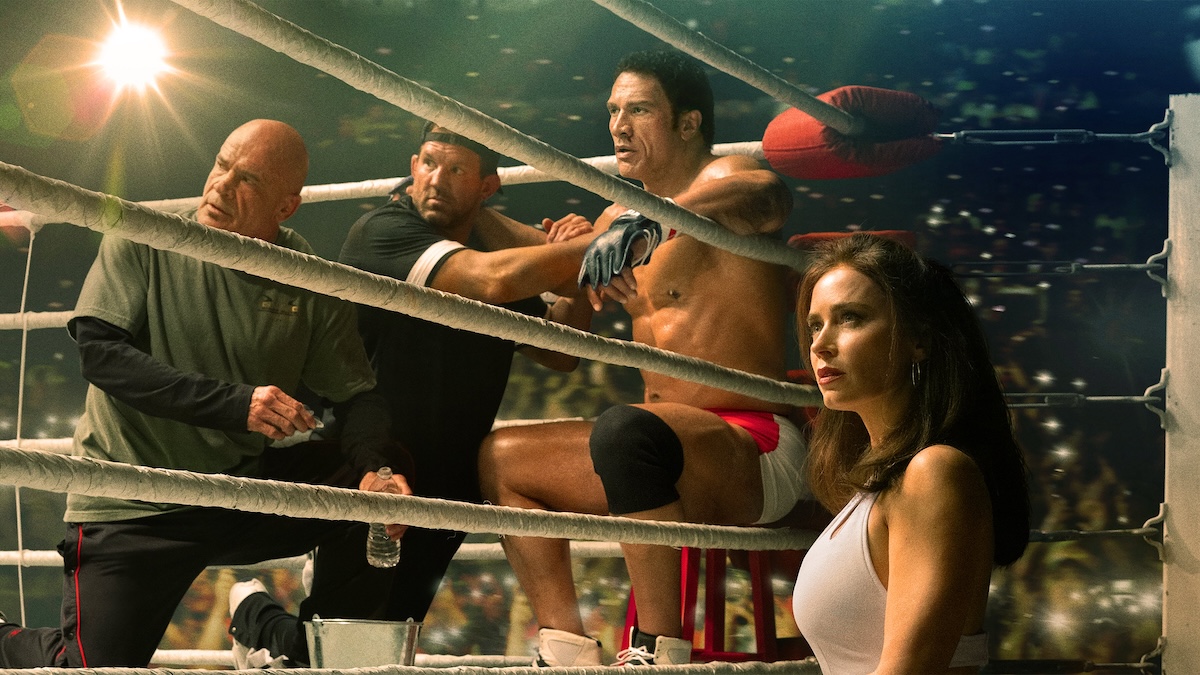
There’s been a significant amount of publicity surrounding Dwayne Johnson’s (Red Notice) performance as Mark Kerr since The Smashing Machine premiered at the 2025 Venice International Film Festival. While such acclaim is best approached with an understandable sense of scepticism, in this rare instance, the attention is entirely justified. Allowing him the rare opportunity to grapple with perhaps one of the most complex roles of his career, Johnson delivers a physically demanding and emotionally vulnerable turn as the legendary mixed martial arts fighter. Naturally, his background as a professional wrestler lends an authenticity to his commanding presence, and the fight sequences are executed with convincing intensity. Yet, it’s when the gloves come off and the roar of the crowd subsides that he embraces a vulnerability that’s never been seen on the big screen.
Offsetting his intimidating physicality with a disarmingly soft voice and an unexpectedly gentle warmth, Johnson is unflinchingly empathetic outside the octagon. Whether he’s tenderly engaging with strangers or manipulating a pharmacist to secure an opioid prescription, the actor imbues Mark with an endearing childlike innocence. However, there’s a subtlety on display that reveals the turbulence simmering underneath his carefully maintained affability. His despondent gaze and timid demeanour quietly suggest a man suffocating beneath the crushing weight of expectation. Ultimately, audiences will emerge from The Smashing Machine with a rejuvenated respect for Johnson. After cheerfully peddling cinematic pabulum throughout his career, it’s invigorating to see him deconstruct his larger-than-life persona and demonstrate he’s fully capable of venturing outside of his comfort zone.
While Johnson’s performance is worth the price of admission alone, Emily Blunt’s turn as Dawn Staples is proof that both leads are stretching their established personas into different territory. Having built a reputation on portraying women steeped in quiet resilience such as the stoic Evelyn in A Quiet Place (2018) and the unflappable Kitty in Oppenheimer (2023), Blunt fashions a woman equally fractured and combustible as her boyfriend. Dawn is the embodiment of contradictions, a figure entangled with devotion and destruction. Although she’s fiercely devoted to her partner, she’s incredibly manipulative and borderline psychologically abusive towards him because she’s not the centreof his world. Each moment she’s on screen, the actress imbues the atmosphere with a fraught unpredictability. During fleeting moments of vulnerability, her prolonged silences and stolen glances communicate her aching fragility and unspoken insecurities. However, when intimacy curdles into confrontation, she explodes with the startling ferocity of a woman whose love has become self-inflicted harm. It’s a performance that resists dissolving into archetypal sentimentality and is devastatingly human.
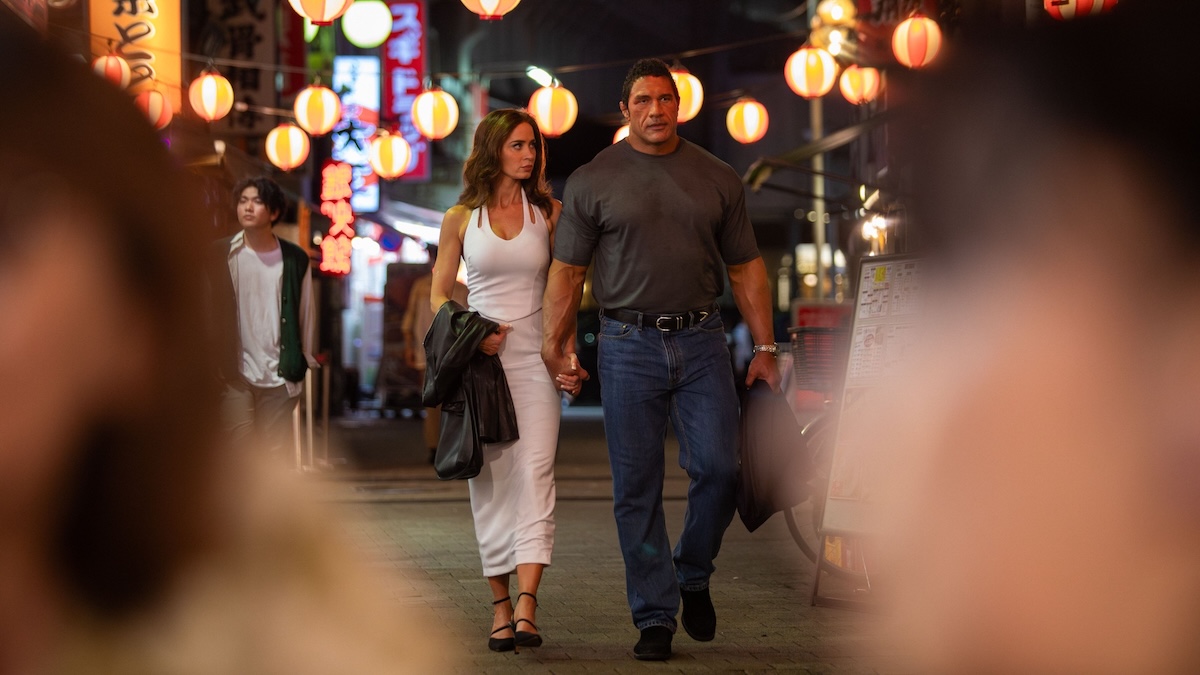
It’s writer-director Benny Safdie who faces the greater artistic hurdle, as The Smashing Machine marks his first solo venture following his celebrated collaborations with his brother Josh. Much of the fractious immediacy and hyper-stylised chaos that characterised Good Time (2017) and Uncut Gems (2019) give way to a more observational and naturalistic mode of storytelling. With a meticulously steady hand, he creates something more akin to a cinematic documentary, steeped in long unbroken sequences and handheld camerawork. Drawing inspiration from John Hyams’ HBO documentary The Smashing Machine: The Life and Times of Extreme Fighter Mark Kerr (2022), Maceo Bishop’s (Uncut Gems) cinematography observes its subjects from the corners of dimly lit hotel rooms, hovering around the edges of gyms, watching from just beyond the ropes of the squared circle. This discreet perspective conveys the feeling of being a fly-on-the-wall, as though the audience has been granted illicit access to a man’s unravelling.
Though a marked departure from the frenzied claustrophobia of Safdie’s earlier work, The Smashing Machine retains some of his trademark intensity. He makes no effort to glamorise Mark’s profession, capturing the fight sequenceswith an unvarnished brutality. Unfolding in all their unflinching realism, every twisting submission and concussive blow lands with devastating weight. In a stroke of audacious casting, Safdie intelligently enlisted real fighters including Ryan Bader, Oleksandr Usyk, and Satoshi Ishii, to inhabit the ring alongside Johnson. It’s a perilous gamble considering that many are stepping before the camera for the first time. Yet, the decision pays off. The presence of these seasoned MMA veterans imbues the proceedings with a bruising authenticity that no stuntman could feign.
While Safdie’s vérité aesthetic lends a narrative sheen to Mark’s story, those familiar with Hyams’ original documentary may find themselves haunted by a persistent sense of déjà vu. Certain moments such as a conversation with an elderly woman inside a doctor’s office have been recreated verbatim, and Mark’s bouts have been meticulously reconstructed from archival footage. However, where the screenplay does distinguish itself is in the sustained focus on exploring his turbulent relationship with Dawn. The film frequently lingers on the couple’s most unflattering moments, resulting in explosive sequences of codependent dysfunction. Neither party emerges as irredeemably monstrous, but their overall dynamic forms a toxic storm of fervent dysfunction. Mark Coleman’s (Ryan Bader) silent disapproval when Dawn appears before a crucial fight in Japan offers an understated glimpse of the corrosive undercurrents at play.
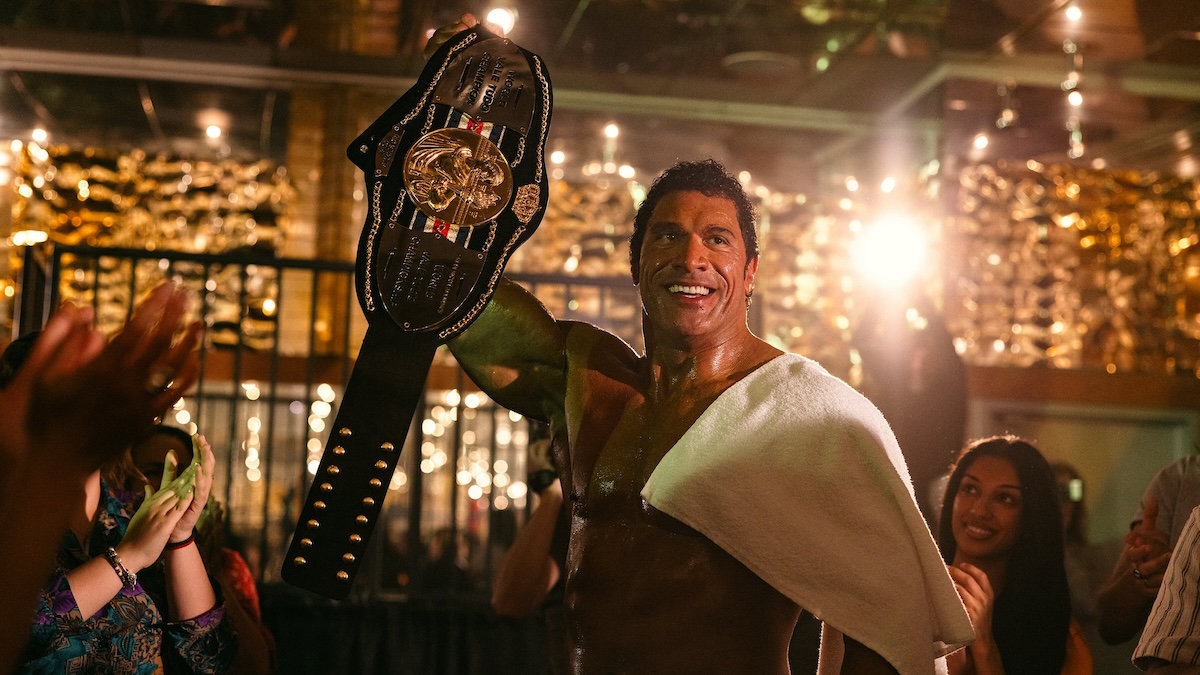
From there, their interactions oscillate unpredictably between playful repartee and simmering hostility, often growing more contentious at the slightest provocation. Sometimes these disagreements are seemingly incidental such as neglecting household chores or pruning the saguaro cactus incorrectly, which spoils the chance for it to resemble a cartoonish silhouette. Whereas other domestic disputes are deeply disquieting and frequently culminate in violence and threats of suicide. These dramatised quarrels provide for some feverish melodramatic flourishes and allow Safdie to capture the spectacle of dysfunction. However, they never quite pierce the surface of Mark and Dawn’s relationship. They gesture toward the pathology of codependency without ever truly interrogating the insidious nature of it.
Therein lies the central shortcoming of The Smashing Machine as a whole. Despite Safdie’s technical prowess and kinetic sensibilities, he struggles to articulate a compelling rationale for why Mark’s story warrants cinematic treatment. The screenplay fails to establish substantial dramatic stakes, resulting in the audience feeling curiously detached from forming a coherent emotional connection with the characters. Mark’s struggles with drug addiction and turbulent personal life lay the groundwork for a searingly intimate character study of an athlete undergoing the seismic transformation both within and beyond the confines of the octagon. However, his story never comes to dramatic fruition, with events simply unfolding with surface-level intensity. Unlike sports biopics that get voyeuristically intimate with the masculine fragility of their protagonists such as Bennet Miller’s Foxcatcher (2014) and Sean Durkin’s The Iron Claw (2023), Safdie keeps the audience at an emotional distance. The 120-minute runtime offers a sketch of Mark’s life, but it’s never truly explored in ways that make The Smashing Machine more engaging or insightful than the documentary that already exists.
Benny Safdie is enough of a cinephile to recognise that the best sports biopics are meditations on failure or accounts of personal victories. The Smashing Machine aspires to this lineage and almost earns its place within it. It’s meticulously crafted and anchored by Dwayne Johnson’s turn that may become one of the most complex and humane performances of his career. However, in hewing so close to source material, it lacks the ambition and spirit that make Mark Kerrsuch an indomitable figure in the world of MMA.
USA • JAPAN • CANADA | 2025 | 123 MINUTES | 1:85:1 | ENGLISH • JAPANESE

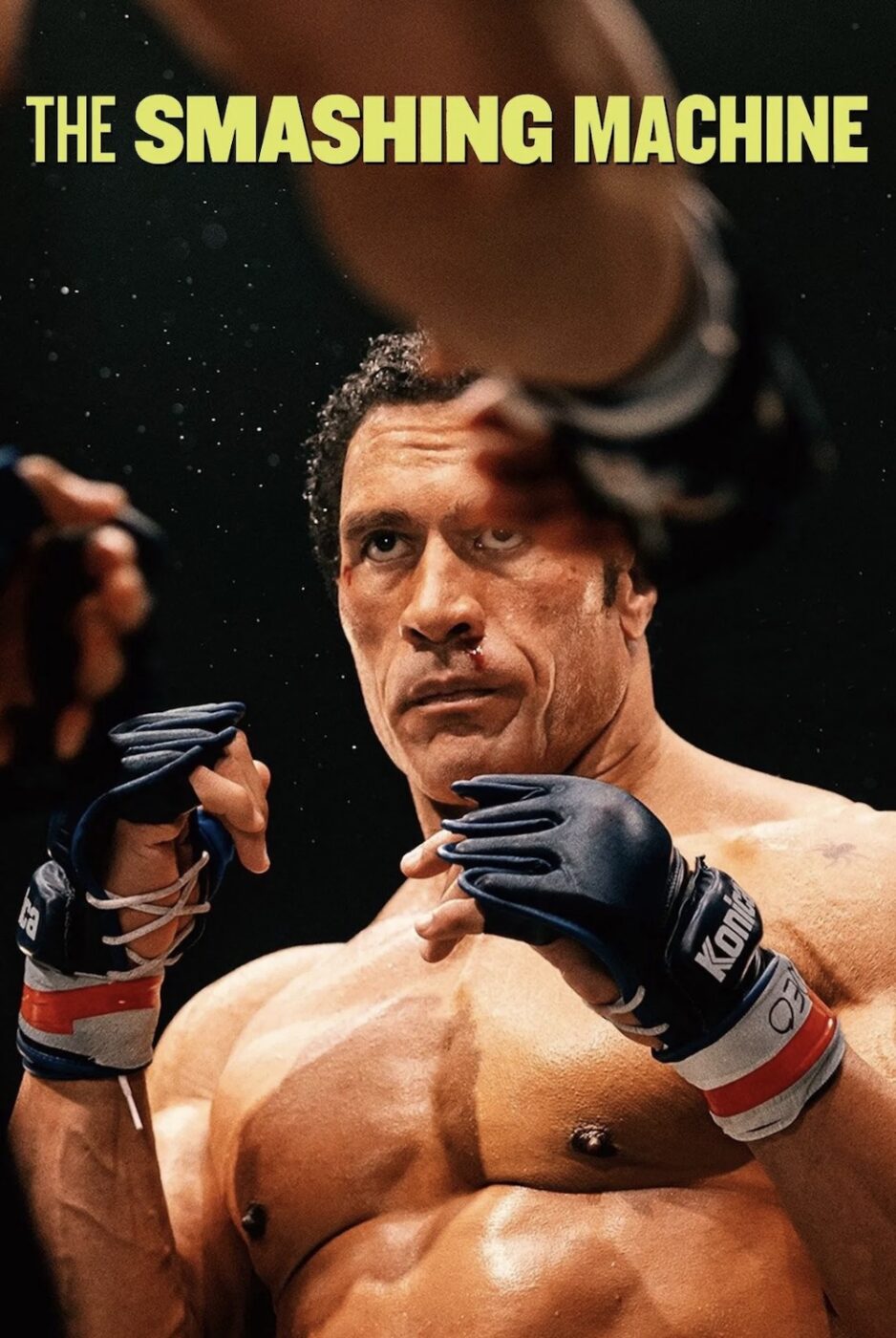
writer & director: Benny Safdie.
starring: Dwayne Johnson, Emily Blunt, Ryan Bader, Bas Rutten & Oleksandr Usyk.
